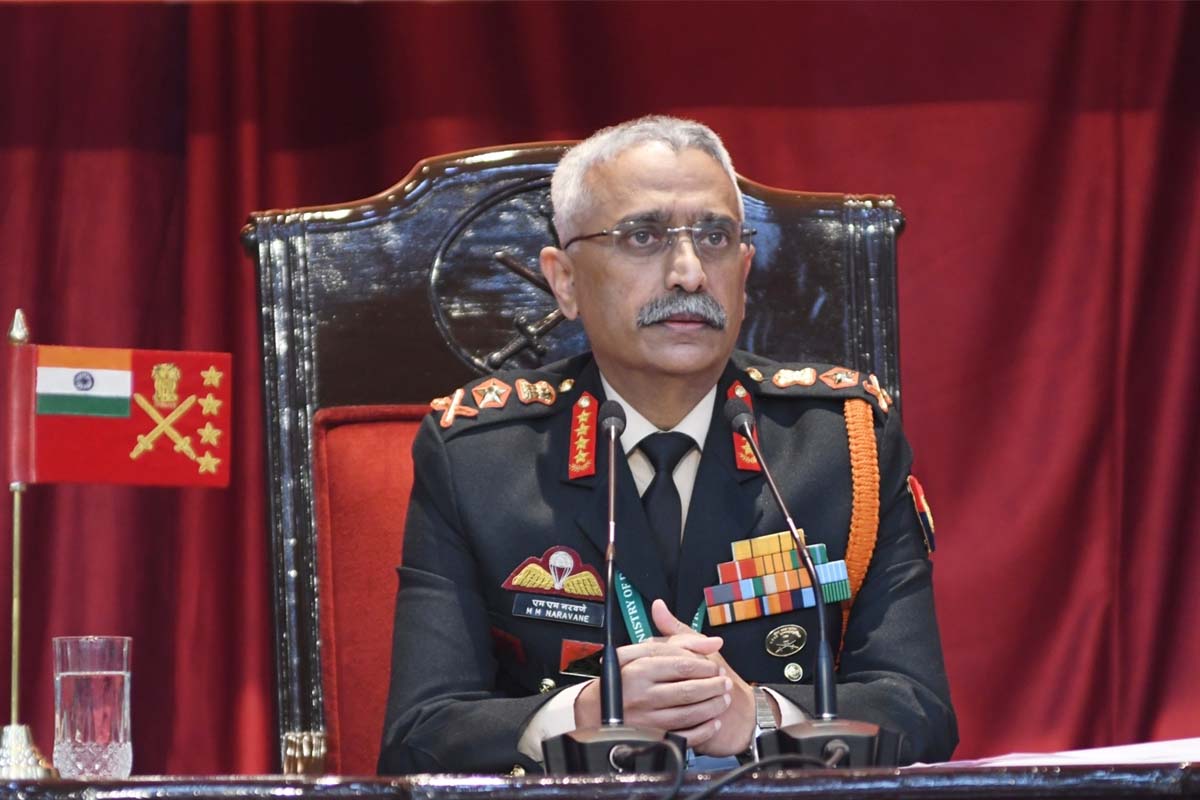Manipur looted weapons issue: Army, security forces recover INSAS rifles, guns, pistols, mortars, IEDs
Defence spokesman Lt. Col Amit Shukla said security forces also destroyed several illegal bunkers in the Kangpokpi district.
In ‘Podcast with Smita Prakash,’ Gen Naravane said that the Chinese army has been trying to alter the status quo along the LAC in very “small incremental steps” and over a period of time Beijing has gained a lot.

Indian Army chief, Gen MM Naravane (file photo)
Former Indian Army chief General Manoj Mukund Naravane has said that China’s attempts to change the status quo on the Line of Actual Control (LAC) by resorting to “salami slicing” tactics have led to a “more assertive” response from the Indian Army,
In ‘Podcast with Smita Prakash,’ Gen Naravane said that the Chinese army has been trying to alter the status quo along the LAC in very “small incremental steps” and over a period of time Beijing has gained a lot. The former Indian Army chief’s remarks come in the wake of the December 9 face-off of the Chinese army with Indian troops in the Yangtse area of the Tawang sector of Arunachal Pradesh on December 9, in which the Chinese were pushed back by the Indian Army.
Advertisement
“China has been trying to alter the status quo along the LAC for many years, decades in fact, and they have been doing this in very small incremental steps which by themselves do not look very dangerous. They look quite innocuous. What we call salami slicing, coming up one inch at a time. But in the bargain over a period of time they have gained a lot. This is the tactics they have adopted and were continuing to do,” Gen Naravane said.
Advertisement
“There was a time to say this much and no further. So that is what actually happened as they kept trying to probe especially north of the Panong Tso (lake in Ladakh). They come time and again and then they want to make it a historical fact that we have been coming here. They tried to alter the status quo as it is existing,” he added.
The ex-Indian Army Chief said that casualties suffered by the Chinese Army during the Galwan clash in June 2020 were the first time they got “jhatka” amid China resorting to “encroaching” territory of its neighbors over the past two decades and its territorial disputes in the South China Sea.
General Naravane recalled former Defence Minister George Fernandes’ remarks about China being a threat “number one” and said people have now become more cognizant of it.
Following the actions of the Chinese Army, Indian and Chinese troops clashed violently in Galwan in eastern Ladakh in June 2020 in which 20 Indian soldiers laid down their lives. The Chinese have admitted four casualties but the numbers are believed to be significantly higher.
Asked if India delayed its action to counter China’s gradual encroachment moves, Naravane said, “Yes. Maybe it happened over a period of time. Things came ahead in 2020 (Galwan clash).”
He indicated that India’s response to Chinese aggression in Galwan Valley had showed to the world that it is possible to take on “neighbourhood bullying”.
Asked about if India’s retaliation to China during the Galwan clash diminished Beijing’s stature at the global stage, General Naravane said, “Not only the PLA, it diminished the stature of China as a country in the global eyes. After this clash occurred and we showed that it is possible to stand up to China who tries to bully its smaller neighbours.”
“Once we did that… I think it is from Canada to Lithuania and Europe to the Philippines, everyone actually got that feeling that yes…if you are fighting for what is correct and if your principle stands, it is possible to take a stand even against China. And we do not have always to be cowed down by the might they try to project. India as a country showed to the world that it’s possible to take on neighborhood bullying. We showed, it can be done,” the former Army chief said.
Gen Naravane said it is better to have a stable and peaceful border rather than continuing to have “small incidents” every now and then, which becomes a setback to overall relations.
Defence Minister Rajnath Singh on Tuesday informed both houses of Parliament that China’s People’s Liberation Army (PLA) troops had tried to transgress the Line of Actual Control (LAC) in the Yangtse area of Arunachal Pradesh Tawang Sector on December 9 and unilaterally change the status quo but they went back to their locations due to timely intervention of Indian military commanders.
Giving similar statements in the Lok Sabha and the Rajya Sabha, the Defence Minister assured that “our forces are committed to protecting our territorial integrity and will continue to thwart any attempt made on it”.
He further said “the scuffle led to injuries to a few personnel on both sides”, and clarified that “there are no fatalities or serious casualties on our side”.
The clash near Yangtse along the LAC in the sensitive sector took place amid the over 30-month border standoff between the two sides in eastern Ladakh.
Advertisement